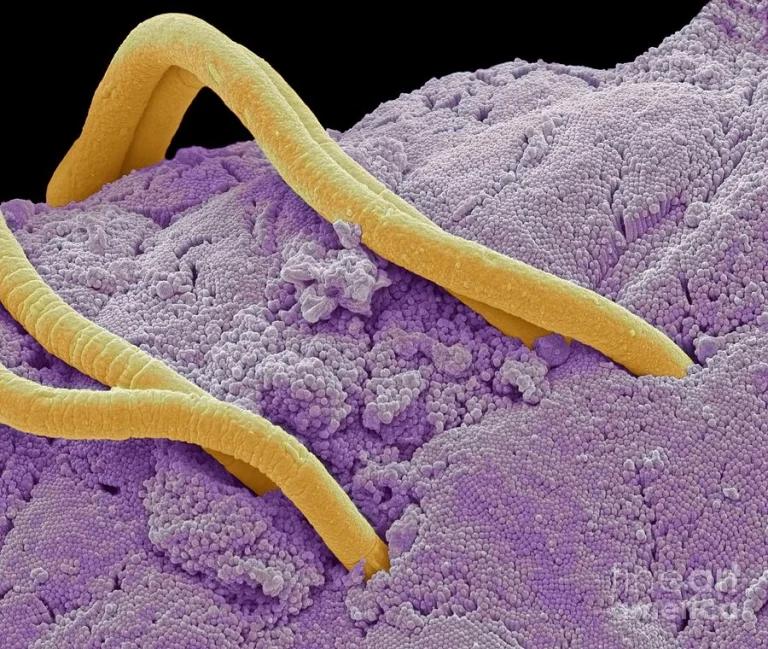Intestinal Parasite Infections
Get valuable insights into Intestinal Parasite Infections, including its causes, symptoms, prevention strategies, and treatment options, while also learning about how you can lower the cost of the medications used to treat Intestinal Parasite Infections.
MEDICAL INFORMATION
Intestinal Parasite Infections Key Facts
Related Medications
Intestinal Parasite Infections: Causes, symptoms, and treatment
Intestinal parasite infections are a common health issue, particularly in developing countries. The World Health Organization (WHO) estimate 50 million people around the world suffer from amoebic infection annually, resulting in 40 to 100 thousand deaths each year. These infections are caused by various types of parasites, including helminths (worms) and protozoan parasites. While helminths are more prevalent in tropical and subtropical regions, protozoan parasites are more commonly found in developed countries. In this comprehensive guide, we will explore the causes, symptoms, and treatment options for intestinal parasite infections.
Types of intestinal parasites
A parasite is classed as an organism that lives on or inside another organism. This definition applies to microbes, bacteria, fungi and viruses. It also includes intestinal protozoa (Giardia lamblia), consisting of only one cell, which reproduce by cell division, and worms, which are larger organisms, which produce larvae that develop before becoming capable of infecting people. Worms (helminths) include Nematodes (roundworms), such as hookworms, and trematodes (flatworms), such as flukes and cestodes (tapeworms).
There are 4 species of intestinal worm, sometimes called soil-transmitted helminths and geohelminths: Trichiuris trichiuria (whipworm), Ascaris lumbricoides (roundworm), Necator americanicus (hookworms), and Ancylostoma duodenale.
These types of parasite infections occur most commonly in developing countries, where sanitation and adequate water facilities are not available. Food and water-borne outbreaks of these parasites occur, with the infectious cyst form of the parasite being relatively resistant to chlorine. Intestinal worms rarely cause death. Instead, they cause long term effects on the health of the host. In addition, intestinal worms also reduce the physical and mental growth of children, prevent educational achievement, and affect economic development.
Other common intestinal parasites include Blastocystis hominis, Giardia intestinalis, Entamoeba histolytica, and Cryptosporidium spp. Parasitic diseases caused by these protozoan parasites are giardiasis, amoebiasis, and cryptosporidiosis respectively.
Common types of intestinal worms
- Flatworms, including tapeworms and flukes
- Roundworms, which cause pinworm, ascariasis, and hookworm infections
Causes of Intestinal Parasite Infections
Gastrointestinal parasite infections are primarily caused by poor sanitation and hygiene practices. They can be acquired through various risk factors, including:
- Living in or visiting areas known for parasites: Certain regions, especially in developing countries, have a higher prevalence of intestinal parasites due to inadequate water and sanitation facilities
- International travel: Traveling to countries with poor sanitation increases the risk of acquiring intestinal parasites
- Poor sanitation: Lack of access to clean drinking water and proper waste disposal systems contributes to the spread of parasites
- Poor hygiene: Failure to practice good hygiene, such as washing hands properly, increases the risk of parasite transmission
- Undercooked meat from an infected animal. More common in Eastern Europe, Latin America, sub-Saharan Africa, India, and Asia
- Age: Children and the elderly are more susceptible to intestinal parasite infections
- Exposure to child and institutional care centers: Close contact in childcare settings can facilitate the transmission of parasites
- Weakened immune system: Individuals with weakened immune systems, such as those with HIV/AIDS, are more prone to developing severe infections
Symptoms of Intestinal Parasite Infections
Intestinal parasite infections can vary in severity and may remain asymptomatic for an extended period. However, when symptoms do occur, they commonly include:
- Abdominal pain: Persistent or recurring pain in the abdominal region
- Diarrhea: Frequent loose stools, which may contain blood or mucus in severe cases
- Nausea or vomiting: Feeling of sickness or throwing up
- Gas or bloating: Excessive gas formation and bloating of the abdomen
- Dysentery: Loose stools with blood and mucus, often accompanied by cramping
- Rash or itching around the rectum or vulva: Irritation and itching in the anal or genital area
- Stomach pain or tenderness: Discomfort or tenderness in the stomach area
- Fatigue: Persistent tiredness and lack of energy
- Weight loss: Unexplained and unintended loss of body weight
- Passing a worm in your stool: In some cases, you may notice worms in your stool during bowel movements
- Anemia: Hookworms attach to the intestinal wall in the small intestine, causing blood loss resulting in anemia for the host
- Intestinal blockages: Food and stools are unable to move freely
- Malnutrition: Deficiencies, excesses or imbalances in the intake of energy and/or nutrients
It is essential to note that not all individuals infected with intestinal parasites will experience symptoms. However, even asymptomatic individuals can transmit the parasites to others.
Diagnosis of Intestinal Parasite Infections
If you suspect an intestinal parasite infection, it is crucial to consult a healthcare provider for proper diagnosis. The following diagnostic tests may be conducted:
- Fecal testing: The Centers for Disease Control and Prevention (CDC) recommends to test a stool sample thrice over several days
- Scotch tape test: A simple method involving the application of tape to the anal area to collect samples for microscopic examination. This test is particularly effective in detecting pinworm infections
- X-rays with barium: In certain cases, imaging tests using barium may be performed to diagnose more severe complications caused by parasites
It is important to note that accurate diagnosis is essential for determining the appropriate treatment regimen.
Treatment options for Intestinal Parasite Infections
Soil-transmitted helminth infections are more common in poorer endemic areas of developing countries. The aim is to reduce suffering caused by these infections to a point, where they are no longer a public-health issue, as well as to improve the development, and intellectual capacity of infected children. Control will only occur when chemotherapy is supported with an improvement in sanitation and water supplies, and re-enforced with education. Permanent control of transmission will only occur with economic development and an improvment in living conditions.
Treatment for intestinal parasite infections typically involves the use of specific medications targeted against the identified parasite. These medications are effective in eliminating the parasites from the body. The choice of medication and duration of treatment will depend on the type of parasite involved. Commonly prescribed drugs include:
- Metronidazole – used for the treatment of parasitic infections of the small intestine, amebic liver abscess, and infections of the colon causing bloody diarrhea
- Iodoquinol – for treating moderate or asymptomatic forms of amebiasis. It is an amebocide used against E.histolytica. It is used to treat cysts and trophozoites in the lumen of the intestine
- Diloxanide furoate – a luminally active drug used to treat cysts of E. histolytica in asymptomatic patients and those with mild, noninvasive disease, and as an after treatment with metronidazole in patients who have invasive amebiasis
- Paromomycin – used to treat intestinal parasites
- Chloroquine – for the treatment of patients with various parasitic infections, and hepatic amebiasis
- Trimethoprim-sulphamethoxazole – for the treatment of infections due to the protozoal parasites Cyclospora and Isospora
- Nitazoxanide, a broad-spectrum anti-parasitic agent
- Albendazole – FDA-approved to treat a variety of parasitic worm infections
- Complementary and alternative therapies: While conventional medical treatments are generally more effective, some alternative treatments can be used alongside medications. However, it is crucial to consult a healthcare professional before trying any alternative therapies
In addition to medications, certain dietary and lifestyle changes may help in the treatment and prevention of intestinal parasite infections. These include:
- Nutrition and Supplements: Avoiding simple carbohydrates and consuming foods known to have antiparasitic properties, such as garlic, pumpkin seeds, pomegranates, beets, and carrots. Increasing fiber intake and taking probiotics, digestive enzymes, vitamin C, and zinc supplements may also be beneficial
- Herbal Remedies: Some herbs, such as garlic, barberry, goldenseal, Oregon grape, anise, wormwood, curled mint, and black walnuts, have traditionally been used to combat parasites. However, it is important to seek guidance from a qualified practitioner due to potential side effects and interactions with other medications
- Homeopathy: Homeopathic remedies may be considered based on an individual’s constitutional type and specific symptoms. Common remedies for intestinal parasite infections include Cina, Cuprum oxidatum nigrum, Indigo, Teucrium, Podophyllum, Spigelia, Sabadilla, and Stanum
While these complementary approaches may offer some benefits, they should not replace conventional medical treatments. Always consult with a healthcare professional for the most appropriate and effective treatment plan.
Prevention of Intestinal Parasite Infections
Preventing intestinal parasite infections involves adopting proper hygiene and sanitation practices. Here are some preventive measures to consider:
- Good hygiene: Wash hands thoroughly with soap and water, especially after using the toilet and before handling food
- Safe water and food practices: Consume clean and filtered water, and ensure food is adequately cooked and prepared in hygienic conditions
- Avoid fecal contamination: Avoid contact with human or animal feces and maintain a clean living environment
- Proper waste disposal: Ensure the proper disposal of waste materials to prevent contamination
- Wearing shoes: In areas where parasite transmission is common, wearing shoes can reduce the risk of infection
- Avoiding high-risk environments: Minimize exposure to environments with poor sanitation and hygiene practices
- Seeking medical advice before travel: If traveling to regions with a high prevalence of intestinal parasites, consult a healthcare professional for preventive measures and appropriate vaccinations
By following these preventive measures and seeking prompt medical attention when necessary, the risk of intestinal parasite infections can be significantly reduced.
FAQs
What is a parasitic infection?
A parasitic infection is a condition or illness caused by parasites living in your body. Parasites need a host (another living thing) to get nutrients they need to survive
Can intestinal parasites cause long-term damage?
If you do not treat intestinal parasite infection it may cause permanent damage and long-term illness. Make sure you are tested for parasites if you are struggling with a chronic disease that has not been properly diagnosed.
How are intestinal parasite infections diagnosed?
Your healthcare provider will check if you have lost weight recently and if you have travelled out of the country recently too. If your healthcare provider thinks you may have an intestinal parasite, you will have a fecal test to examine your stools, the Scotch tape test, or x-rays with barium to diagnose more serious problems.
Can you have an intestinal parasite without any symptoms?
Yes. Parasites can live in your intestines for many years without causing symptoms. Symptoms, when they occur, include abdominal pain and diarrhea.
What types of intestinal parasites infect humans?
The most common parasites to infect humans are Nematodes (roundworms), cestodes (tapeworms), and trematodes (flatworms).
Conclusion
Intestinal parasite infections are a significant health concern, particularly in developing countries. Understanding the causes, symptoms, and treatment options for these infections is crucial for effective management. Prompt diagnosis, appropriate medical treatment, and adopting preventive measures are vital in controlling the spread of intestinal parasites. It is essential to consult with a healthcare professional for accurate diagnosis and personalized treatment plans. By practicing good hygiene and following preventive measures, individuals can minimize their risk of intestinal parasite infections and maintain optimal health.
Note: The primary keyword for this article is “intestinal parasite infections,” and the secondary keywords can be tailored based on further research. The additional information provided will be integrated into the relevant sections organically.
Sources
- Human Intestinal Parasites – PMC
- Intestinal Parasitic Infections in 2023 – Ahmed – Gastroenterology Research
- Overview of Parasitic Infections – Infections – MSD Manual Consumer Version
- Intestinal worms: Symptoms, causes, risks, types, and treatment
- Centre for Health Protection – Common Intestinal Parasitic Infection
- Parasites: Types, Symptoms, Treatment & Prevention
- Intestinal Worms: Symptoms, Treatment, Causes, Recovery, and More
- Giardia infection (giardiasis) – Symptoms & causes – Mayo Clinic
- Common Intestinal Parasites – AAFP
- Intestinal parasites Information – Mount Sinai – New York
Medical Disclaimer
NowPatient has taken all reasonable steps to ensure that all material is factually accurate, complete, and current. However, the knowledge and experience of a qualified healthcare professional should always be sought after instead of using the information on this page. Before taking any drug, you should always speak to your doctor or another qualified healthcare provider.
The information provided here about medications is subject to change and is not meant to include all uses, precautions, warnings, directions, drug interactions, allergic reactions, or negative effects. The absence of warnings or other information for a particular medication does not imply that the medication or medication combination is appropriate for all patients or for all possible purposes.








